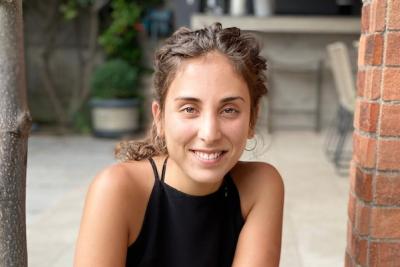Powerful Teaching: The Importance of Yes and Varied Experiences
By Beth Dirkes
An artist’s vision and techniques, an international perspective on education, and the evidence-based instructional strategies taught in Northwestern’s School of Education and Social Policy’s Master of Science in Education program (MSEd). Pilar Rickes Zeger brings all of this and more to her work as an instructor in CTD classrooms.
Zeger was teaching middle and high school art classes in her home country of Chile when she was invited to teach a first-grade art class. Saying yes to that invitation to try something new changed everything for her. She found she loved working with younger students and that her art background was an asset in the elementary classroom. She began pursuing elementary teaching credentials and found the right fit in Northwestern’s MSEd program. Excited about the possibilities of studying abroad, Zeger soon made the move to Evanston, Illinois from Chile. Now she is learning effective, research-based teaching methods through her graduate coursework and discovering new classroom strategies as a Montessori student teacher. But foremost in her practice as an educator is her identity as an artist. Whether teaching a lesson on coding, math, or engineering, Zeger looks at her work in the classroom as training young artists. “I think art helps in comprehension and analyzing things from different perspectives. So, I want to teach other subjects and introduce all my knowledge of art.”
 Zeger began working with CTD as a teaching assistant, where she appreciated the opportunity both to support students and to observe the flow of the class session. “I felt my job was important for the instructors. I appreciated that and I got the chance to observe for three hours. You can’t stand back as a teacher. As a TA, you are helping, but you can reflect.” By the time Zeger stepped into the instructor role for CTD’s grade 1-2 Math Magicians course, she was ready to apply the teacher-led techniques she’d learned in her graduate Math Methods course, such as number talks and story read aloud times and incorporate individual student portfolios, a practice used by art students at all levels.
Zeger began working with CTD as a teaching assistant, where she appreciated the opportunity both to support students and to observe the flow of the class session. “I felt my job was important for the instructors. I appreciated that and I got the chance to observe for three hours. You can’t stand back as a teacher. As a TA, you are helping, but you can reflect.” By the time Zeger stepped into the instructor role for CTD’s grade 1-2 Math Magicians course, she was ready to apply the teacher-led techniques she’d learned in her graduate Math Methods course, such as number talks and story read aloud times and incorporate individual student portfolios, a practice used by art students at all levels.
Curating experiences that lead to discovery and foster each student’s natural curiosity is a hallmark of CTD instruction. As an educator and an artist, Zeger leans into that process. “Students are all different. They all have different ways of thinking and of expressing themselves. So, by giving them the open choice that art brings, you’re letting them express the way they want to and the way that makes sense to them. So, in that way, I can differentiate between each student because each of them will approach it differently. And that’s perfect.”
Teaching for CTD requires thoughtful preparation and lots of energy. Why take on this challenge on top of a full-time graduate program? Like her curious and motivated students, Zeger just can’t pass up a chance to learn and try something new. “I love it. It’s amazing. It’s also a lot of hard work, but you have more possibilities than in school.” For example, Zeger relishes the chance to teach the same topic for multiple hour class sessions. “I think that’s so valuable…Sometimes students need three hours to really comprehend the concepts we’re introducing.” By now Zeger has taught a variety of topics to several grade levels, including CTD’s youngest students at the PreK level. She finds the engaging subject matter and diversity of topics challenging, but empowering. “During the summer I taught Coding and Robotics and Building Bridges…So what I have taken from these courses is that the lessons I can do are just endless. The things I can approach are endless.” A fitting takeaway for a CTD teacher and her students.
If you are interested in working with CTD, as a teaching assistant, instructor, or other role, check out our job opportunities page or e-mail us at ctd@northwestern.edu.

